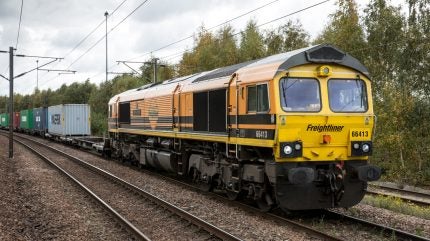
Freight and logistics company Freightliner has called on the UK Government to do more to support the country’s rail freight industry after the launch of its first rail freight growth target.
The company has been pushing for three key policies to support the industry’s target of growing rail’s freight volumes by 75% by 2050, including cutting track access charges by 50%.

Discover B2B Marketing That Performs
Combine business intelligence and editorial excellence to reach engaged professionals across 36 leading media platforms.
CEO Tim Shoveller continued to praise the government’s introduction of the target but said it needed to be backed by policies supporting a transition towards increased use of rail freight solutions.
He said: “Policies that address the cost gap between road and rail and ensure sufficient capacity for freight services to run on the network are necessary to provide confidence to the private sector to continue to make the significant investment within the rail freight industry that will deliver the growth.”
Freightliner’s policy proposals also include doubling the modal shift grant offered to businesses when using rail transport would cost more than road equivalents, and a call for continued investment in the rail network to ensure sufficient capacity on busy corridors.
In addition to benefiting the industry, Freightliner said its proposals would also support the UK’s net zero ambitions and pointed to Germany’s investment into electrification and the capping of electricity rates for rail freight as models of possible success.

US Tariffs are shifting - will you react or anticipate?
Don’t let policy changes catch you off guard. Stay proactive with real-time data and expert analysis.
By GlobalDataThe company’s desire for more support was backed by UK representative body Rail Freight Group (RFG), which told Railway Technology that, in order to achieve the growth target, a “more sympathetic approach” to rail freight was needed.
Phil Smith, RFG’s assistant policy manager, said he was particularly concerned that a promise made by Prime Minister Rishi Sunak to use funds reallocated from the cancelled Birmingham to Manchester leg of HS2 to improve the UK network’s capacity were yet to come to pass.
Smith commented that state investment into growing rail freight carried less risk than passenger rail as private companies were responsible for most of the costs, with the industry only calling on the government to invest more in infrastructure and network capacity.
The RFG and Freightliner comments come ahead of the UK’s general election, which could lead to changes for the country’s rail industry if the Labour Party wins. It has proposed an overhaul of the country’s rail system that would include a greater focus on freight, something which was welcomed by organisations like RFG.
Meanwhile, the current Conservative administration previously said it had no plans to cap electricity costs for rail freight, but highlighted its investment into electrification and welcomed talks on opening up capacity.
Freightliner’s environmental proposals are particularly notable given the company’s back-and-forth relationship with the use of electric locomotives, previously temporarily retiring its electric fleet over struggles with costs.





